by Justin Mckibben | Dec 21, 2017 | Alcoholics Anonymous, Christmas, Coping Skills, Family, Holiday, Recovery, Sober Fun, Sobriety
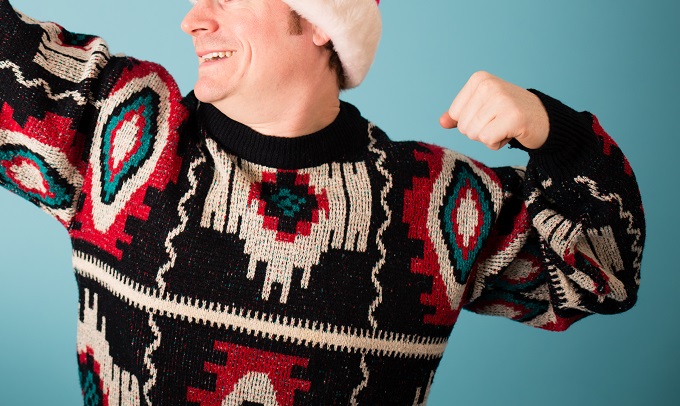
(This content is being used for illustrative purposes only; any person depicted in the content is a model)
Welcome one and all to Step 6 of our 12 Steps of Christmas in Recovery. Today we are talking about how that little bit of Grinch might slip out, and how to check ourselves before we Scrooge ourselves.
And no geese-a-laying… lazy geese!
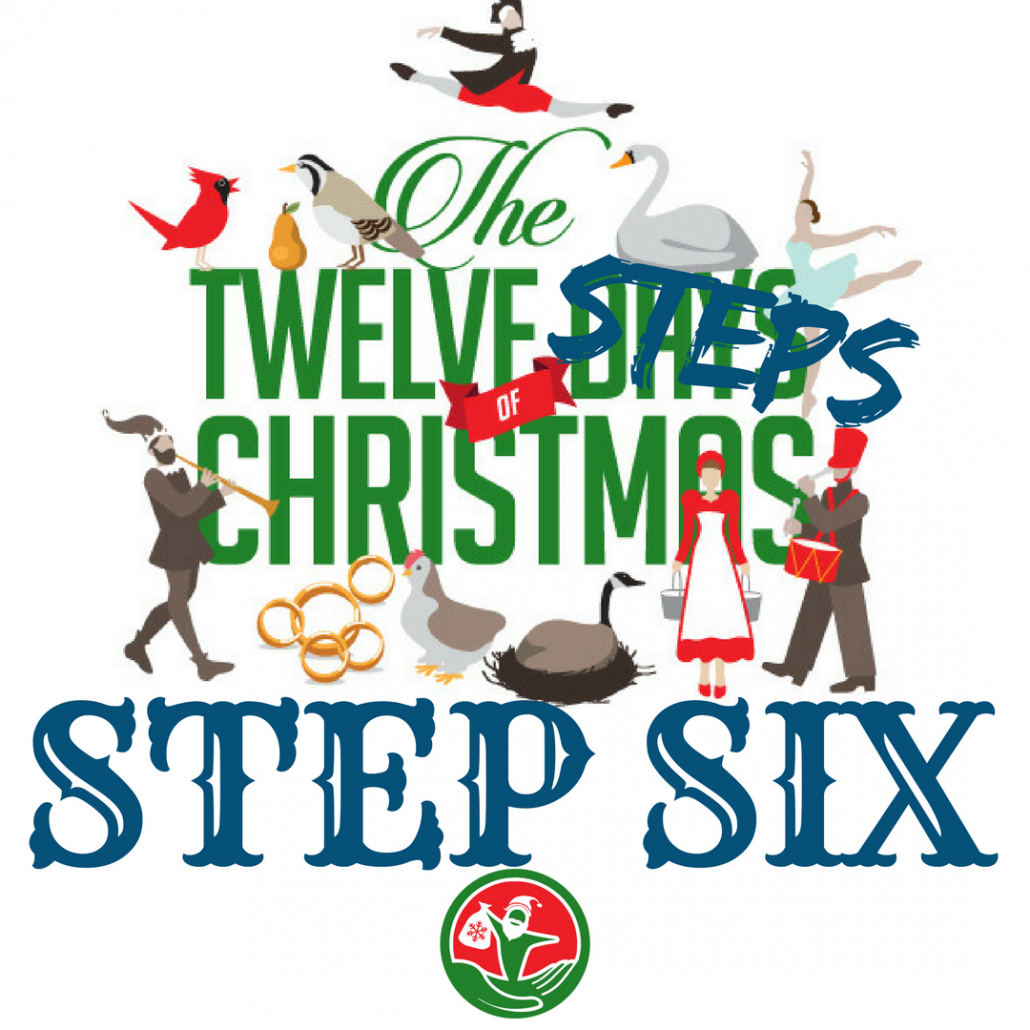
Step 6: Become entirely ready to let go of the Ba Humbug.
In Step 5 we talked more about accountability and recognizing our Grinch-like moments. We encouraged you to speak up and have a support system to call on when things get tough, and now we are talking even more about letting go of those destructive feelings on Christmas.
Of course, the classic “A Christmas Carol” tells us about another infamous grumpy guy, Ebenezer Scrooge. Essentially, he and the Grinch are the same, except Scrooge isn’t a nappy ball of green fur who does B&Es. Instead, Scrooge has the privilege of being visited by some ghosts who show him visions that scare the Christmas spirit back into him.
Scrooge is notorious for his Ba Humbug, a statement made referring to his utter ambivalence toward anything remotely related to goodwill toward others or joy and cheer.
Well, we all tend to have a touch of that Ba Humbug attitude at least once during the holiday. But, much like the Scrooge-man himself, we have to learn to let it go. Hopefully, we all won’t need the ghost of our best friend haunting us to do it. In Step 5 we recognized our character defects and our negative reactions. Here in Step 6, we are making a more conscious effort to let go of our feelings of Ba Humbug and move on. In Step 5, we said we should admit these feelings to ourselves and someone else. This helps us to face what is bothering us and share it with our support. Now we try to move on from those feelings.
Learning about letting go…
Ebenezer Scrooge may have got over his Ba Humbug overnight, but it took a lot of work. Part of that work is preparing you to let go of the attitude or mindset that is making Christmas harder for you. If spending time with your family is proving more difficult than you planned, it’s OK.
Like we went over in the first few steps; we accept that we can’t change them, be open and willing to enjoy the holiday anyway. We make a list of things we would like to get out of the sober Christmas experience. Talk with someone about the negativity you may bring to the equation, and now we put ourselves in the head-space to let go of any bad attitude we are holding on to.
In a lot of 12 Step recovery literature, Step 6 is often talked about as being ready for your Higher Power to remove your defects of character. In essence, you are further recognizing your behavior and preparing to drop the old patterns and attitudes that caused so much chaos. You are asking for that which holds you back to be removed, whether by a god of your understanding or simply your own higher consciousness.
Let us suggest doing the same here for that case of the Humbugs you are carrying around. By whatever means seem adequate to you, seek to let go of the feelings or thoughts that are spoiling your Christmas spirit and keeping you from embracing the joy and connection of your friends and loved ones.
Change of heart…
Part of the reason Scrooge had such a change of heart is that he was shown in great detail how his past and present life were impacted by his Ba Humbug BS. Then, he was shown how staying on this path was going to be the end of him. For some of us in recovery from drug or alcohol addiction, we have a similar view.
If our character defects are allowed to run rampant, we may find ourselves traveling down a destructive path that will lead us to relapse, which could absolutely be the end of us.
So, in the context of the holidays, we look at how continuing down a path of Ba Humbug with negativity and hostility, we can bring a less than cheery end to our own Christmas. Like Scrooge, we can have a dramatic impact on those around us in the present, because we already know what is has done in the past. If we have the self-awareness, we are able to see what this kind of state of mind can do to the future of our Christmas.
A change of heart, which is helped along by the previous steps like acceptance and self-awareness, is one way to make the best out of the bad situations or temptations some of us in recovery can come up against. Be ready and willing to let go of the Ba Humbug as soon as you catch it, so that you can help work toward a better time of merriment for those closest to you.
#12StepsofChristmas
You’re not a mean one, man. Don’t be a Grinch. The holidays might seem hard in recovery, but if you speak up when you need help and keep the spirit of the season in mind, you are sure to have plenty to celebrate. For those struggling this holiday season, ask for help; not just for your family but, for yourself. Give yourself and those who love you the most the best gift you can. If you or a loved one is struggling with substance abuse or addiction, please call toll-free now.
CALL NOW 1-888-922-5398
by Justin Mckibben | Dec 21, 2017 | Alcoholics Anonymous, Christmas, Coping Skills, Family, Holiday, Recovery, Sober Fun, Sobriety

(This content is being used for illustrative purposes only; any person depicted in the content is a model)
As we count down the days until the big guy with the hipster beard in red comes to slide some Christmas love under our trees in exchange for some glutton-free cookies and vegan almond milk, we also take some time to talk about what is important for those in addiction recovery during the holidays.
We’ve made it all the way to Step 5 of our 12 Steps of Christmas in Recovery. Today we are talking about how that little bit of Grinch might slip out, and how to see when the mean green gets out.
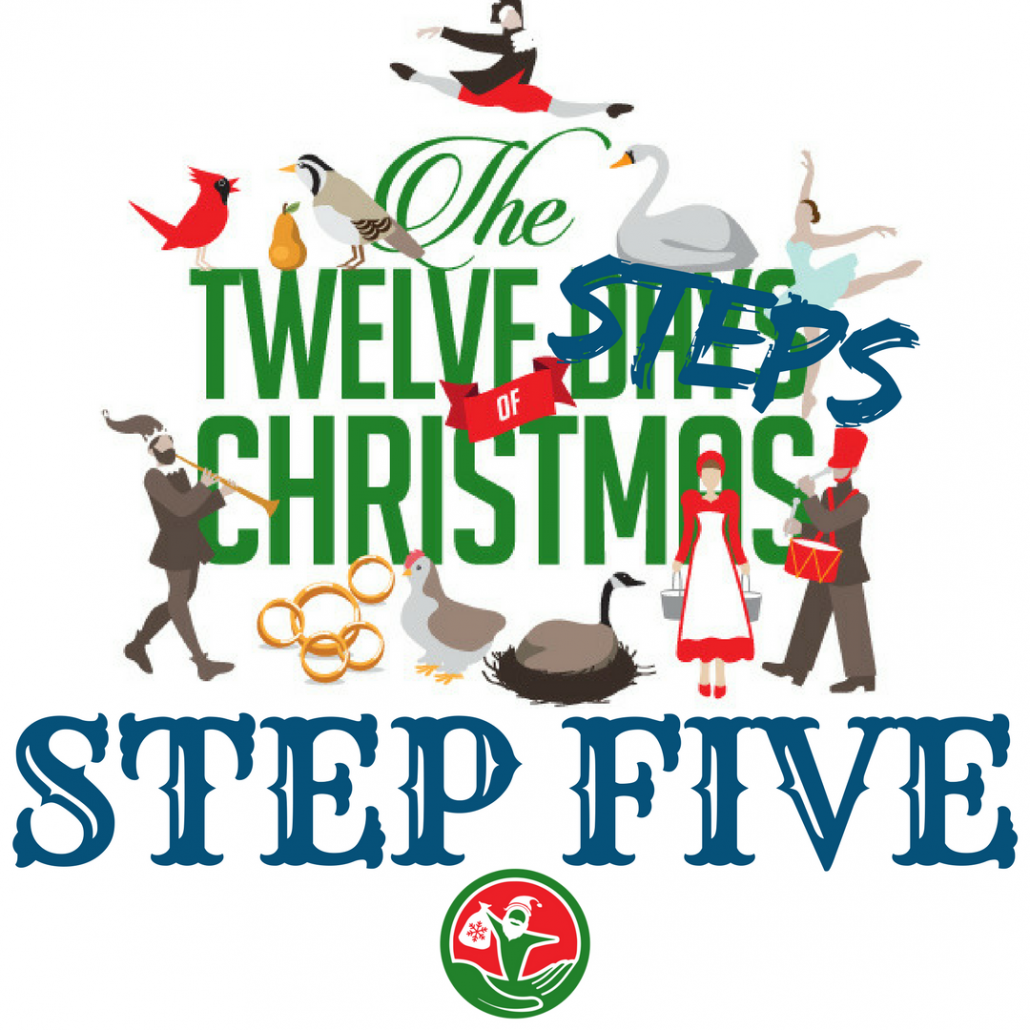
Step 5: Admit to ourselves and another human when we are being a Grinch.
In Steps 1, 2 and Step 3 we talked a lot about acceptance and facing unmanageable situations during your Christmas in recovery. In Step 4 we took a lighter approach to making a personal inventory by making it a Christmas wish-list. Now, for Step 5 we are setting ourselves up for more accountability during the holiday.
By this time we have talked about trying our best to accept the things beyond our control, and now we look even more at what we can control; ourselves. Our actions and reactions do have an effect on others, and Christmas time is definitely a time to make sure we are putting our best foot forward in our relationships. So after we have accepted what is out of our control, and set goals for how we hope to make the holiday in recovery a special one, we have to admit when we are being a Grinch.
In the past, some of us might have literally stolen Christmas. Maybe you didn’t disguise yourself as Santa and snatch up the tree and decorations to take Christmas away from everyone else, but you may have done some things in the past that made it hard on your loved ones. Either we actually got far enough down the road of addiction that we were pawning off presents, or we were simply stealing our loved ones’ peace of mind.
This year, let your true love keep her 5 golden rings.
Maybe now your heart has grown a couple sizes since getting clean and sober, but that doesn’t mean there isn’t still a little Grinch in you somewhere. The point is to be accountable to yourself and your loved ones when that mean, green, anti-Whoville machine peeks out.
Don’t get me wrong, it’s easy to be a Grinch when the holiday is in full gear… all the noise, noise, NOISE!
We all need a Max to our Grinch…
I hope I’m not the only nerd who remembers Max, the lovable side-kick puppy who Dr. Seuss’s Grinch character disguised as a reindeer to pull the sleigh on their Christmas tree burglary spree.
You remember? Ok great… I was worried for a minute.
Anyway, Max seemed to be the only one in the majority of the story that the Grinch actually cared about (in his own dysfunctional and unhealthy way). Max was Grinch’s day one; his BFF; his road-dog! Everyone should have at least one friend as good as Max. Because even though the Grinch was so cold, Max was his buddy and had his back.
Now, you might think you can just be friends with your own dog for Christmas, and that’s cool, but you’re missing the analogy.
Having a Max is having someone during the holiday that you can confide your frustrations and difficulties with. If your mood is taking a turn for the worst, or you get stuck in a funk, having a friend like Max to admit your Grinch-tendencies to can help lift some of the weight off your shoulders. In many addiction recovery groups, they talk about how important it is to have people you can be honest with; people you can depend on.
Being able to admit when you are struggling with staying grounded and getting through all the stress brought on by the season can make a huge difference. Sometimes just talking about the temptations or the aggravations can make facing them easier. So this holiday season you should not hesitate to share your struggles with someone who you trust. They might even have your back like Max.
Remember what Christmas is about…
In the classic children’s story, the Grinch realizes that he had never stopped Christmas at all, because even though he stole all the ribbons and tags; Christmas came without packages and boxes and bags. He has the sudden revelation that this special time of year is about coming together with connection and compassion.
This year, when you can take the time to talk to those you love about what is bothering you, you have a better chance of working past it. We all have to remember in recovery that we can bring so much more to the holidays with love and compassion. So when the Grinch in you tries to steal away your own Christmas joy, face it head-on. Admit when it is there for yourself and others. Connect with your support, your sponsor and your family at a time when it is most important.
And seriously, don’t steal those 5 golden rings.
#12StepsofChristmas
You’re not a mean one, man. Don’t be a Grinch. The holidays might seem hard in recovery, but if you speak up when you need help and keep the spirit of the season in mind, you are sure to have plenty to celebrate. For those struggling this holiday season, ask for help; not just for your family but, for yourself. Give yourself and those who love you the most the best gift you can. If you or a loved one is struggling with substance abuse or addiction, please call toll-free now.
CALL NOW 1-888-922-5398
by Justin Mckibben | Dec 19, 2017 | Alcoholics Anonymous, Christmas, Coping Skills, Family, Holiday, Recovery, Sober Fun, Sobriety

(This content is being used for illustrative purposes only; any person depicted in the content is a model)
Guess what folks… we are in Step 3 of our 12 Steps of Christmas series! We are happy to share our ideas on how the 12 Steps most commonly associated with fellowships for alcohol or drug addiction recovery can actually be applied to other aspects of life. These concepts on self-awareness, reflection and compassionate action have such incredible value, that formatting them to talk about the stresses of the holidays seems like a pretty good way to spread some Christmas spirit and cheer.
We look forward to reading your comments and seeing what you think can be done to help support people in recovery during the Christmas season! While relapse is always something to protect against, the stress from relationships you may still be in the process of repairing can be pretty intense itself.
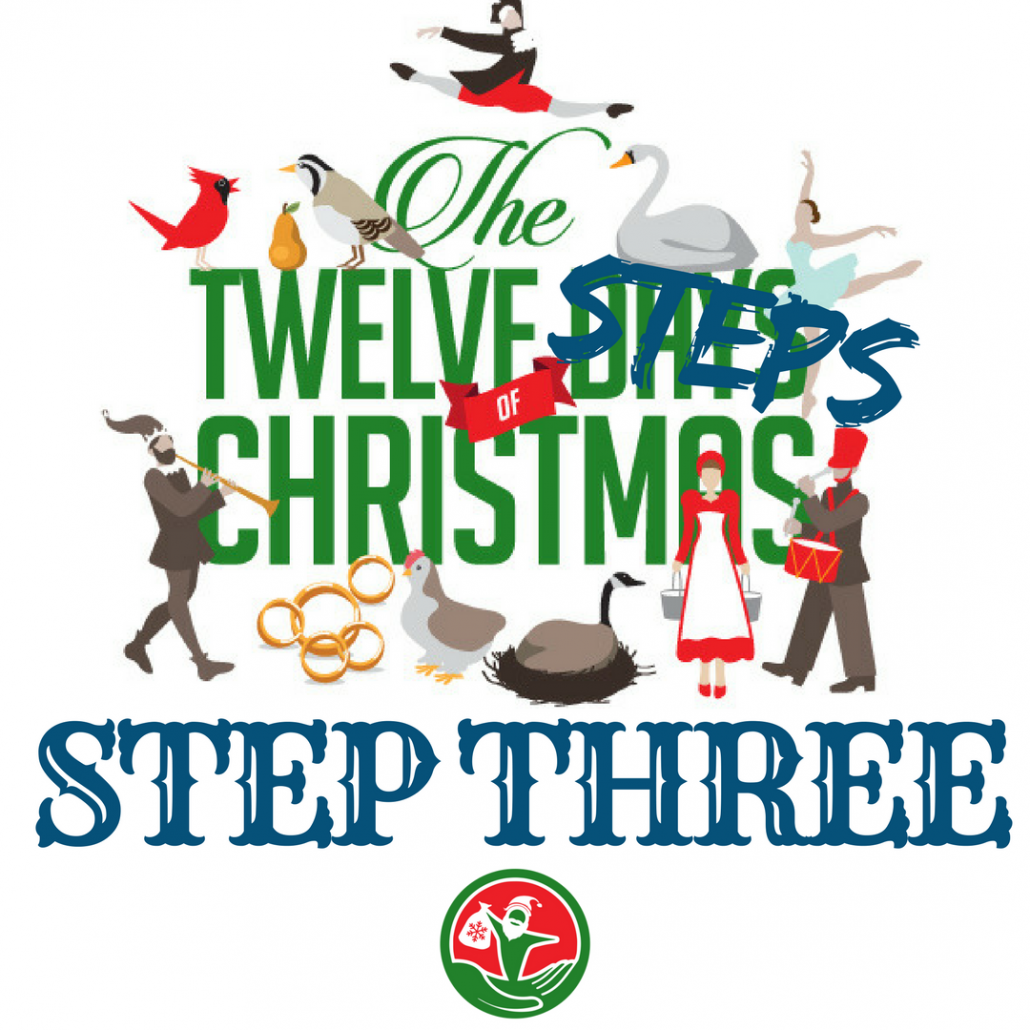
Step 3: Made a decision to turn your Holiday over to the care of your Higher Power.
Some people are probably reading this one like “PAUSE, we already did the talk about the Higher Power stuff in Step 2, don’t wanna do it again!” So before you get too worked up, let’s just relax. We remind you that this isn’t about trying to sell you on any specific concept of a god, or an established faith, or a belief system. We are not trying to recruit you.
That being said, we will talk about the whole Higher Power business a bit more, but not much.
But first, can we talk about the “French hens” from your true love… I mean, what is so French about them, anyway? Do they eat croissants? Isn’t this discrimination against hens? I demand an explanation!
When we say turn your holiday over to this Higher Power, we are not saying your sobriety for Christmas will be contingent on whether or not you have accepted a certain god into your life. Some people think when we talk about turning control over, it means you get to cop-out and take no responsibility.
Have a little faith in the holiday spirit…
Going back to the beginning in Step 1 of Christmas, we know that things with our families or friends can be unmanageable; meaning we are not always in control of how everyone gets along during the holidays. We are not in control of which uncle starts arguing about politics at the dinner table, or of which aunt decides to try and cook for the first time since that one year that nobody brings up anymore. You can’t control how many pairs of socks you unwrap this year, or how many times you hear the same carols over… and over… and over!
You also aren’t in control of how others may react to your sobriety either. If they are doubtful, suspicious or even overbearing, you cannot change them by force. It might just take some patience and some follow-through. Once we can accept that we are not in control of everything, we can learn to let go and try to have some of that ‘faith’ stuff people keep talking about.
Most of all, you can’t control anyone else’s feelings. In recovery from addiction, we learn to let other people be who they are, and to try to be the best version of ourselves in response. We learn to bring all the joy to the world we can without drugs or alcohol, and let the rest take care of itself.
Like in Step 2, we can either put that faith in a God of our understanding, in a Higher Power or belief system we have, or simply in the goodwill toward others that we always hear about during Christmas time. Just giving up the attempt to control the holidays and allowing yourself to be present in the celebration can make Christmas so much easier.
Control and responsibility aren’t always the same…
The idea that being responsible means always being in control is a foolish way to look at the world. The truth is turning things over helps you focus your responsibility for what you actually can control.
No one is always in control of everything in their lives, even the most powerful and influential people on earth. Sometimes the mistletoe of life catches you off guard. Whether we like it or not, life has a way of surprising us. So when we talk about turning things over to something outside yourself, we mean relinquishing some control, not responsibility.
Of course, you still have to be responsible for how you react, and how you treat others. During the holiday chaos, we can still be considerate of their discretions or even their suspicions of our recovery. It isn’t really the purpose of hour Christmas to win them over. We can simply try to apply all that we have learned and all we are trying to accomplish to show people we care about doing better. We can still set our boundaries and be responsible for maintaining them, even with our families.
You still might find some lumps of coal in the stockings, but at least you know in recovery you are strong enough to take some lumps and keep it moving.
Forget the French hens though, I don’t know if I trust that.
Surviving Christmas with the family sometimes means turning things over and only taking responsibility for yourself. In recovery, you have a new chance at loving your family and friends the way you always meant to. Maybe that means accepting the gift as it is. But if you or someone you love is still struggling during the holiday, ask for help. Please call toll-free now. You are not alone.
CALL NOW 1-888-922-5398
by staff | Dec 18, 2017 | Alcoholics Anonymous, Christmas, Coping Skills, Family, Holiday, Recovery, Sober Fun, Sobriety
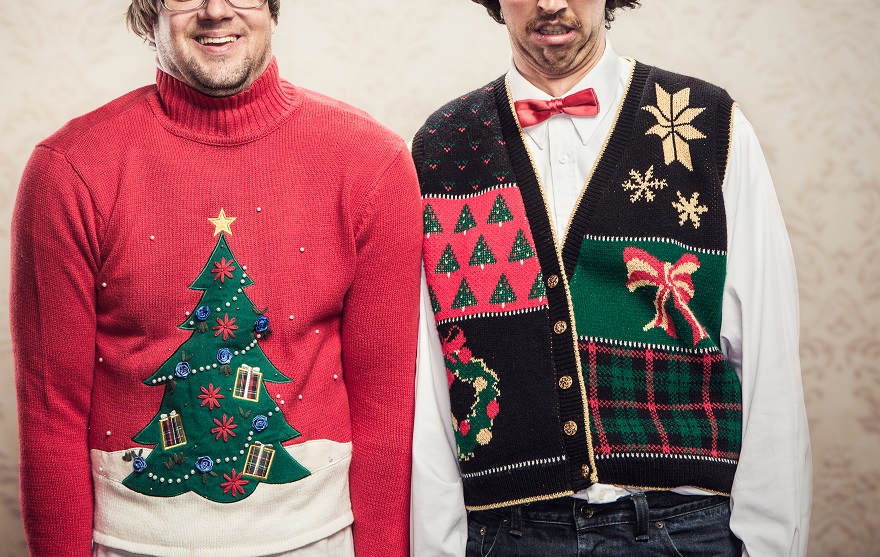
(This content is being used for illustrative purposes only; any person depicted in the content is a model)
Welcome to another exciting edition of the 12 Steps of Christmas; our own take on the classic Christmas carol, with a sobriety-themed twist to try and bring some more compassion and insight to a cheerful time of year for those of us in recovery from drugs or alcohol. Substance use and addiction can make the season a tough time, but we want to help anyone who may be struggling or just people in recovery who need a little inspiration, to get in the right state of mind for the holiday.
Of course, we want to hear your feedback, and we are happy to share with our followers and friends more of the 12 Steps of Christmas.
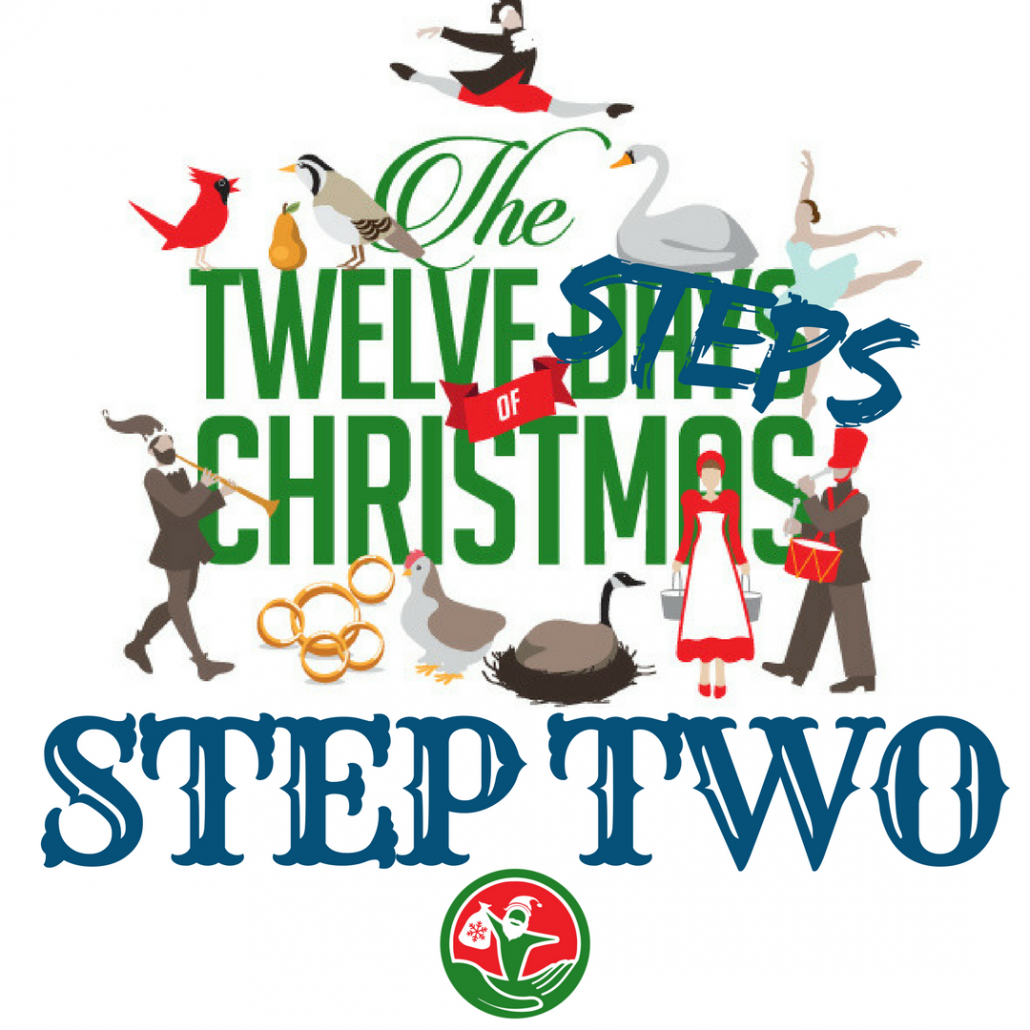 Step 2: Came to believe a Power Greater than myself could restore my holiday cheer
Step 2: Came to believe a Power Greater than myself could restore my holiday cheer
You may remember that in Step 1 of Christmas we talked about unmanageability and about how the holidays and our loved ones are pretty much out of our control. So then what do we do?
Well, for this one the 2 turtle doves probably aren’t going to cut it. For those familiar with the 12 Steps used in many recovery fellowships, there comes the concept of believing a Power Greater than yourself can help you out. Now for some, this can be the most difficult aspect of 12 Step programs because any implication of concepts like faith or spirituality can create contempt or frustration. People may resist this idea, thinking it is pushing a certain god or religion onto them.
Some people think Santa is more realistic than a god. Well, fine… try delivering presents to all the nice kids in the world in one night with only a few reindeer and a belly full of Oreo cookies! Now THAT is a power greater than you, for sure!
St. Nicholas with the mic drop!
We are not here to argue the idea of any god. We aren’t trying to force anyone into some kind of religious epiphany or preach any gospels. But, for those who are open to exploring the idea of a Higher Power; it can be extremely helpful when we talk about the struggles we face during stressful holidays.
Step 2 is all about finding the willingness to believe something outside of yourself can help you through this holiday. Sure, you should also be aware of yourself and your actions. But be open to the idea that you don’t have to force the holiday to be special, it just is.
Tis the season for believin’ dude!
Rejoicing without religion…
Now, of course, one thing is that not everyone celebrates Christmas in the first place. Different religions and cultures celebrate in various ways during this time of year.
We are pleased to wish everyone a Happy Chanukah, a Joyous Kwanzaa, and everything in between. In no way are we saying sobriety depends on your commitment to a faith during any holiday. For those who find themselves celebrating Christmas, there can be a great deal of diversity in how you celebrate and why. Even though is it historically a Christian holiday, plenty of non-Christians, atheists, and agnostics still celebrate. According to the 2014 General Sociological Survey:
- 21% of the American population does not identify with a religion
Younger people tend to be the majority of these trends. Yet, according to a new Pew Research Center survey:
- 90% of Americans celebrate Christmas
- 95% of Christians say they celebrate Christmas
- Only 46% of Americans say they celebrate as primarily a religious (rather than cultural) holiday, down from 51% who said this in 2013
So, with so many people not subscribing to the traditional guidelines of the Christianity, there are plenty of ways to celebrate Christmas without needing to fall in line. In early recovery, a lot of people are still trying to find a foundation to build some kind of understanding of spiritual concepts. So now isn’t the time to push them too hard in one direction or another. Just use this time as a chance to be more open to the joy and cheer that come your way.
You don’t have to be “spiritual” to be in the Christmas spirit…
For those who consider themselves spiritual or faithful, connection with your Higher Power can be the key to getting through the holidays. Some may view this time of year as a specific celebration of their faith and therefore should take every opportunity to remind themselves through the difficulties they face in recovery to appreciate and honor that connection to family and friends.
For those who do not consider themselves spiritual or faithful, you might even consider the holiday itself to be a source of power. The energy and the atmosphere it creates between people might be just enough to help you feel even more compassion and connection to those you love. Even if people don’t want to spend their Christmas in church or in prayer, you can still take the time to connect with your family and friends. Maybe that is what will restore your holiday cheer; the love you have with those you are close to. It doesn’t have to be a god or a faith, just be grateful and present for these moments.
Recovery from substance use disorder gives us the opportunity to cherish things and celebrate life in a new way. Believing that something bigger than you, even if it just Santa Clause or the Christmas spirit, can help bring the joy back into experiencing the holidays with your family and friends. Try to appreciate the chance to be clean, sober and with the people who mean the most to you. If nothing else, that is powerful beyond measure.
And leave some cookies and milk out… just in case.
Take some time this year to be open to the joy of the holidays, even if you don’t know where that cheer comes from. If you are struggling this holiday season, ask for help; not just for your family but, for yourself. Give yourself and those who love you the most the best gift you can. If you or a loved one is struggling with substance abuse or addiction, please call toll-free now.
CALL NOW 1-888-922-5398
by Justin Mckibben | Oct 9, 2017 | Addiction Medicine, Alcohol Addiction, Detox, Nutraceutical Therapy
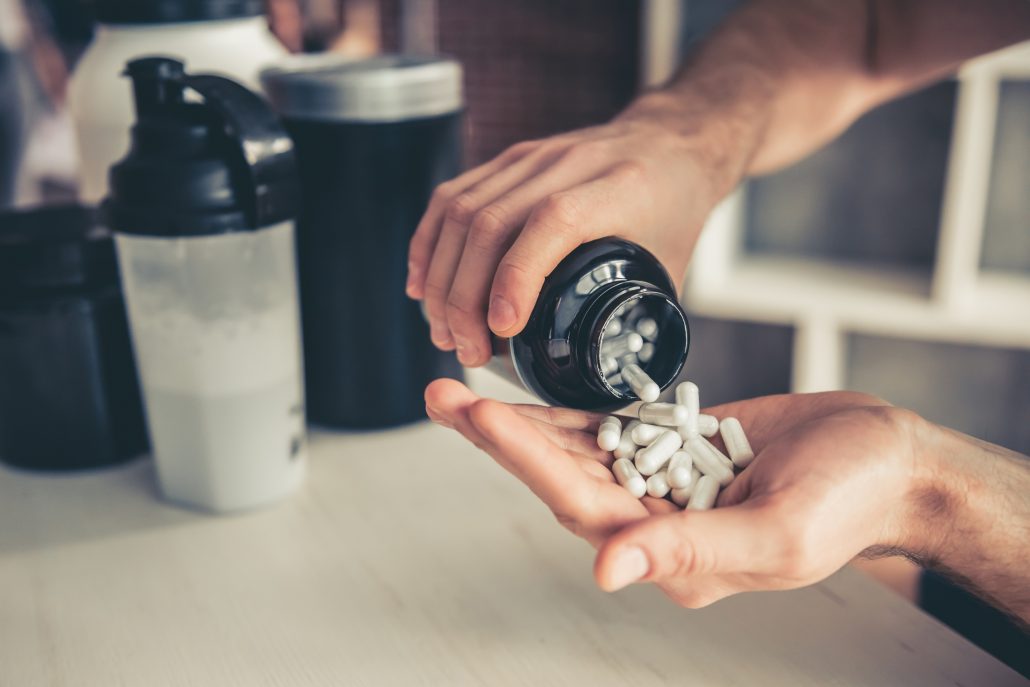
Recently I heard about a new product making a little noise online for being advertised as an all-natural supplement used for drug detox. I had never heard of Mitadone before, but I had heard about people trying to promote what they call more natural home remedies for treating withdrawal symptoms. Some claim to use natural juice cleansing regiments, or synthetic herbal compounds, or various other forms of healthy dietary routines to assist in their recovery from drug or alcohol addiction. However, it seems some people are looking to Mitadone as some kind of ‘miracle supplement.’
So what is Mitadone? Does it Work?
Mitadone Detox
When visiting the official website for Mitadone, one of the first things you will see is that the company claims to offer a variety of detox programs, including:
Some of these options have a number of supplement plans, with different combinations of supplements which seem to imply they assist with different functions at different stages.
For Example- the Opiate Aid Program has a 3 step program with:
- Opiate Withdrawal Aid- 120 Tablets
- 5 Day Detox- 60 Capsules
- Anxiety, Stress Relief, and Mood Support- 90 Capsules
Each with a different purpose and including different ingredients. So what kind of all-natural ingredients are there?
Anit-Opiate Aid Plus Extra Strength
This product is advertised on the site as helping with withdrawal symptoms and cravings from opioid medications and illicit opioids like heroin. The ingredients are listed as:
- Vitamin A (as Beta Carotene)
- Biotin
- Vitamin C (as Ascorbic Acid)
- Calcium
- Vitamin D3 (as Cholecalciferol)
- Pantothenic Acid
- Vitamin E (as D-Alpha Tocopheryl Succinate)
- Glutathione
- Vitamin K1
- Kudzu Root
- Vitamin B1
- Vitamin B2
- Niacin
- Vitamin B6
- Folic Acid
- Vitamin B12
- Magnesium
- L-Theanine
- Guarana
- CoQ10
- 5-HTP
- SAM-e
- Melatonin
- John’s Wort
- L-Arginine
- Rutin Bioperine
- Ginger
- Turmeric
- Peppermint
- Dicalcium Phosphate
- Microcrystalline Cellulose
- Croscarmellose Sodium
- Stearic Acid
- Vegetable Stearate
- Silicon Dioxide
- Pharmaceutical Glaze
Quite a mouth-full, right?
Oh and guess what- its Gluten Free!
The site states the product is “manufactured by a GMP (Good Manufacturing Practices) approved facility that employs FDA certified manufacturing and quality control procedures.” Essentially, the Mitadone program is a large supply of multi-vitamins and other supplements. There are no prescription chemicals or habit-forming substances, according to their description.
Does it Work?
So are these multi-vitamin routines enough to combat such powerful addictions as opioids or alcohol? Well, Mitadone claims with their products you can detox from home, but is that really safe?
With alcohol detox, some withdrawal symptoms can be particularly harmful to your body. Others can even be lethal. With opioids, withdrawals can be extremely uncomfortable or even painful. So while these supplements may be able to help supply nutrients to the body, they aren’t exactly going to be able to support every aspect of the detox process.
If you look closer at the descriptions of these products, it seems Mitadone also knows how limited its impact can be. The fine-print acknowledges that everyone’s body chemistry is different, so the supplements will not always affect everyone the same. Some of the better reviews on Amazon.com still say that while the supplements made them feel a little better in some aspects, they were still extremely sick. Others claim the supplements did nothing to ease the more severe symptoms of opioid withdrawal.
When looking into the product and reading reviews, it is often but in the same category as Kava, which is a beverage or extract that is often advertised as a more natural substance. Some use Kava for recreational purposes. Others also use Kava to try and fight their withdrawals. If we look closer at Kava, it has much of its own controversy. There is a lot of contention as to whether Kava is responsible for liver damage and other health risks. While Mitadone is a totally different product, people associate them both with the concept of self-detoxing through ‘natural remedies’. Yet, many still question how safe or effective they are.
Even on the Mitadone website, in the Opiate Aid and Alcohol Aid programs you can see statements like:
“Increases the chances of substance abuse patients to stay in any maintenance therapy program.”
“Addiction doesn’t necessarily conclude after the patient exits a rehab program.”
So even in their product descriptions, they seem to admit that these supplements are not a solution on their own, but a product that might give someone a better chance while pursuing other specific treatment options.
In short, these kinds of nutritional products can be an asset to your recovery plan, but they are ineffective as a primary recovery strategy.
Nutraceutical Therapy and Addiction Treatment
Incorporating a healthier diet and perhaps even vitamins and other supplements can be very beneficial for some, but they should be utilized as part of a more holistic approach to addiction recovery.
Palm Healthcare Company offers Nutraceutical Therapy as part of a holistic addiction treatment program. We understand the importance of nourishing the body while also healing the mind. The value of vitamin and supplement therapy should not be underestimated. There is a benefit to supplements such as:
- Multivitamins
- Probiotics
- Digestive enzymes
- Phytonutrients
- Essential fatty acids
Combine these with a healthy, balanced diet and physical therapy can provide an exceptional advantage to someone on the path to recovery.
But we emphasize that recovering from addiction to drugs or alcohol is not just about balancing out the body to help it break its dependence on substances. Recovery is also about comprehensive addiction education, developing new coping skills and addressing personal traumas. There is so much more to a future in recovery.
Mitadone may have a decent product, but people should always remember that with drug addiction it is not always effective, or even safe, to detox on your own. Medical detox is a resource that exists to help people get off drugs as safely and effectively as possible, while providing various lines of support, including nutrition.
Nutritional therapy in addiction treatment recognizes the importance of what we put into our bodies, but it is most effective as part of a complete treatment plan. For those trying to find ways to overcome withdrawal symptoms, a medical detox with experienced professionals can make the process safer and easier. If you or someone you love is struggling, please call toll-free now.
CALL NOW 1-888-922-5398
by Justin Mckibben | Sep 26, 2017 | Addiction Treatment, Alcohol Addiction, Coping Skills, Outpatient Treatment, Recovery, Relapse, Self Improvement, Therapy

(This content is being used for illustrative purposes only; any person depicted in the content is a model)
Safe and effective treatment for drug and alcohol addiction is paramount to creating lasting transformation in the lives of those who are struggling. Providing powerful therapeutic resources with education and innovation makes a significant impact on those who have the opportunity for quality care. An essential part of this process is an active relapse prevention program.
Relapse prevention is a system that influences many aspects of individual recovery from addiction. So what is a relapse? And what makes a relapse prevention program so indispensable?
Relapse Prevention: What is Relapse?
First, let us look at the most basic definition or relapse. If we break it down a little we can better understand what it means and how it happens.
- In general– a relapse is to suffer deterioration after a period of improvement.
- With medicine– relapse is also referred to as recidivism or a return to a past condition.
- In the context of drug use (including alcohol) – relapse is a reinstatement of drug use and drug-seeking behavior. It is the recurrence of pathological drug use after a period of
So the common thread here is that a relapse is when someone:
- Experiences a period of improvement from a problem…
- Is healing from a previous condition…
- Has a period of abstinence, then they experience a recurrence of the initial problem/condition
With addiction, relapse means someone ends a period of improvement and falls back into drug-seeking behavior or even drug use. When you are recovering from a serious addiction, drinking or consuming a drug can sometimes be referred to as a “slip” but it is essentially a relapse. Many recovery advocates and experts are of the opinion that “recovery” means making improvements to behavior, not just abstinence. Therefore, they might say the “real relapse” actually starts when the behavior regresses to the old destructive or compulsive patterns. Some will warn you that you are in the process of a relapse without having used drugs.
Whether you believe the relapse is the behavior or the actual physical manifestation of using narcotic drugs or drinking, you can still see the real value in offering relapse prevention strategies to help avoid either circumstance.
Relapse Prevention: Knowing the Signs
The following are a few signs or behaviors that might indicate that someone may be in the process of a relapse.
-
Depression
When someone is experiencing low moods and lack of energy they might be in a state of depression. Other mental health disorders may begin to intensify and thoughts of suicide may also occur.
-
Exaggeration
Everyday difficulties that occur regularly become overwhelming. The most basic problems can’t seem to be solved.
-
Avoidance
The individual may begin to avoid social or personal activities they once enjoyed, isolating and ignoring their responsibilities.
-
Defensive
Someone in the stages of relapse may become irritable or even confrontational without reason.
-
Denial
The person may rationalize or minimize any attempt at acknowledging and addressing their behaviors.
-
Post-Acute Withdrawal
When Post-acute withdrawal syndrome (PAWS) sets in someone can be at a higher risk of relapse. They can have trouble with memory, emotional overreactions, and sleeping problems, become accident prone or overwhelmed by stress.
-
Lack of Control
Food, sex, caffeine, nicotine, work, gambling, or other activities become out of control. Their compulsive behaviors become consistent without thinking about the consequences.
-
Feeling of Immobilization
Immobilization is that feeling of desperation. People feel trapped and start to think that there is no way to solve their problems other than using or drinking.
-
Justification
When experiencing cravings someone may convince themselves the only way to feel better is to use or drink, and they try to justify it.
-
Abandoning Support System
If someone is in the stages of relapse they may begin to ignore their support systems. They might stop attending support groups, therapy or communicating with their sponsor or loved ones.
-
Chemical Loss of Control
In a relapse, someone recovering from addiction will eventually begin using drugs or alcohol again to solve problems, even if these problems are only being made worse by their use.
Any combination of these symptoms could mean that someone is headed towards a relapse. In some cases, they may have even relapsed already.
Relapse Prevention
Taking action before someone even comes close to a relapse can make all the difference between lasting recovery and dangerous regression. An effective drug and alcohol treatment plan will include a relapse prevention program in order to help people create a solid foundation from which they can build a sustainable recovery.
Education
Understanding the signs of relapse and the serious risks of going back to drug abuse can help someone who may be struggling in their recovery to stay grounded. It is more difficult for someone to know how to take action, and what kind of action to take if they don’t have an understanding of addiction. Palm Healthcare Company places tremendous value on the importance of education in relapse prevention.
PAWS Awareness
In respect to education about relapse, people should also be made aware of the difficulties they may experience with post-acute withdrawal syndrome (PAWS). When people can anticipate or at least understand the difficulty they may experience with PAWS, they can prepare themselves with healthy and preventative strategies.
Coping Skills
Relapse prevention programs should also teach each individual new coping skills to utilize in challenging times. When someone is struggling with their recovery, they should have resources available to them to keep themselves accountable. It is vital that people be taught new and productive methods for recognizing things that are bothering them and addressing them.
Self-Care
Another huge aspect of protecting yourself from relapse is to establish strong habits that keep you to be as mentally and physically healthy as possible. It can be regular exercise, better eating, social and personal relationships, or pursuing your passion or continuing your career. Find a way to care for yourself so that when your recovery is threatened you care enough about your life to protect it.
Continued Support
Having people that support you can make it easier to overcome adversity when it presents itself. When someone has to deal with their troubles alone they may not always see the whole picture; they may not see all the ways to address the issue. Having a support group or a therapist are just a few ways someone trying to recover from drugs or alcohol can make sure they have a safety net in place.
Palm Healthcare Company believes in helping each individual to create a personal plan for recovery that includes relapse prevention and continued support. Our facilities all emphasize the value of comprehensive education, awareness, coping skills, self-care, and aftercare. The solution to drug and alcohol addiction doesn’t end with eliminating the substance, that is only the beginning.
In the event of a relapse, getting the individual to go into an addiction treatment program can be the best way to help them before things get too bad. Getting them back on the road to recovery is crucial, and be sure to look for a program that has a comprehensive relapse prevention program.
Relapse is NOT necessary for recovery, but relapse prevention is. Even if you or someone you love has relapsed, there is still hope to take action that can help you create lasting recovery. If you or someone you love is struggling, please call toll-free now.
CALL NOW 1-888-922-5398







 Step 2: Came to believe a Power Greater than myself could restore my holiday cheer
Step 2: Came to believe a Power Greater than myself could restore my holiday cheer 


